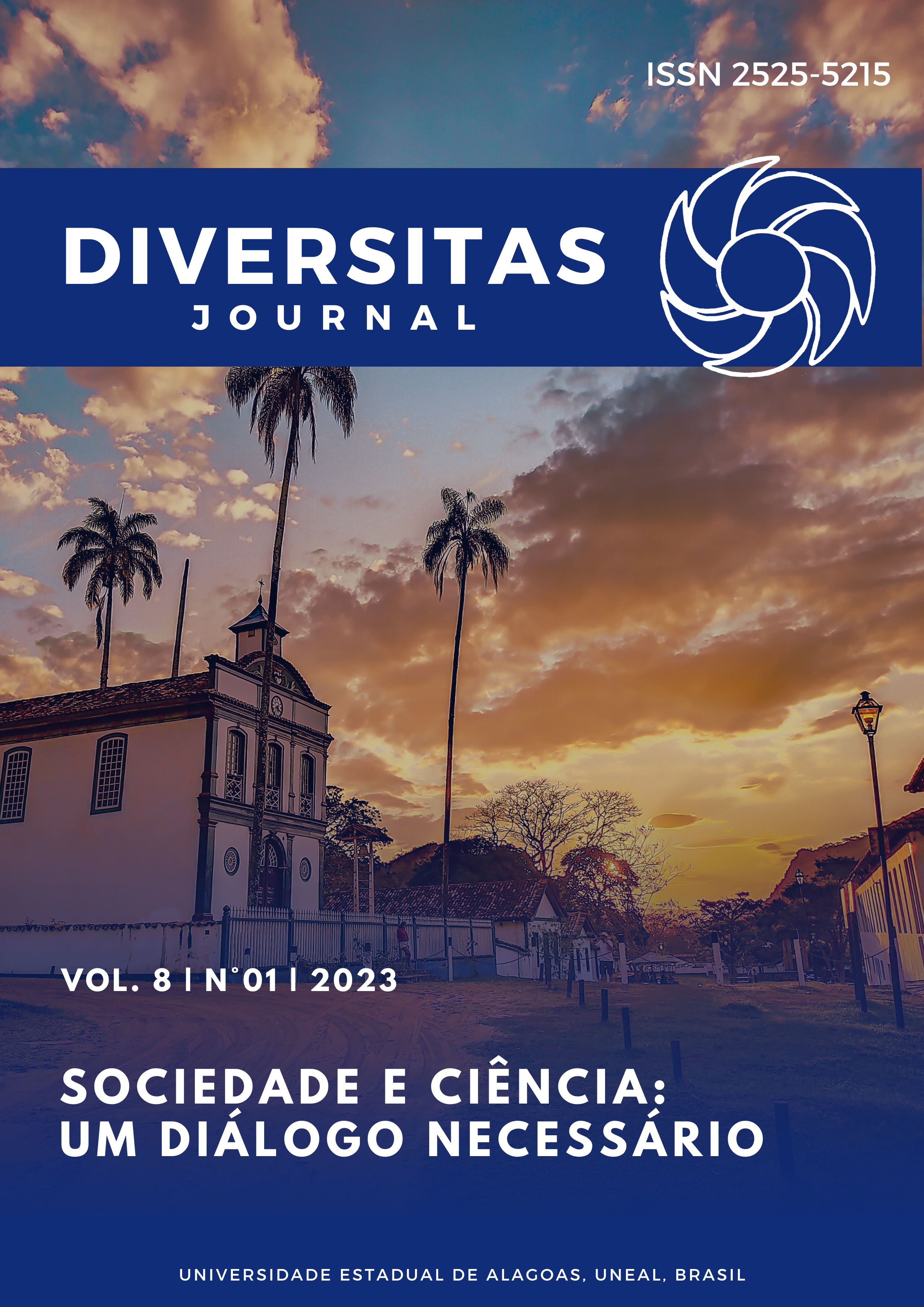Atividade prática investigativa sobre os Grupos Sanguíneos: uma simulação da tipagem sanguínea
DOI:
https://doi.org/10.48017/dj.v8i1.2490Keywords:
Biology Laboratory, Experimental Practical Classes, Research TeachingAbstract
The objective of this work is to describe the planning and development of a practical investigative class on blood groups, seeking to articulate the Biology Laboratory, practical classes, experimentation, Research Teaching and Biology teaching. In this sense, the work is based on theoretical assumptions that version about the contributions of experimental practical classes and the Laboratory of Sciences/Biology for the teaching of Biology, as well as the difficulties encountered, in addition to presenting the Teaching by Research and its operationalization. The methodology is qualitative from an experience report of a biology teacher in order to present observations and experiences during a practical activity of investigative nature. The results bring together the moments of planning, the organization of the space and application of the planned activity. Finally, notes were raised about the contributions of the themes presented in the report for the teaching of Biology.
Metrics
References
BIKLEN, S.; BOGDAN, R. C. (1994). Investigação qualitativa em educação. Porto Editora.
BORGES, A. T. (2002). Novos rumos para o laboratório escolar de ciências. Caderno Brasileiro de Ensino de Física, 19(3), p. 291-313, jan. 2002.
CAMPOS, N. F.; SCARPA, D. L. (2018) Que desafios e Possibilidades Expressam os Licenciandos que Começam a Aprender sobre Ensino de Ciências por Investigação? Tensões entre Visões de Ensino Centradas no Professor e no Estudante. Revista Brasileira de Pesquisa em Educação em Ciências, 18(2), p. 727–759, dez. 2020.
CARVALHO, A. M. P. de. (2018). Fundamentos Teóricos e Metodológicos do Ensino por Investigação. Revista Brasileira de Pesquisa em Educação em Ciências, 18(3), p. 765–794, set./dez. 2018.
CARVALHO, A. M. P. de. (2013). O ensino de Ciências e a proposição de sequências de ensino investigativas. In: CARVALHO, A. M. P. de. Ensino De Ciências Por Investigação: condições para implementação em sala de aula. São Paulo, Brasil. SP: Cengage Do Brasil, p. 1-20, 2013.
CEZAR-DE-MELLO, P. F. T.; GONÇALVES, P. R. (2020). Grupos sanguíneos a partir da aprendizagem baseada em problemas: elaboração e avaliação de uma proposta didática investigativa. Revista de Ensino de Ciências e Matemática, 11(6), p. 918-936, out./dez. 2020.
KRASILCHIK, M. (2009). Biologia: ensino prático. São Paulo: Escrituras.
MOTA, M. D. A. (2019). Laboratórios de Ciências/Biologia nas Escolas Públicas do Estado do Ceará (1997-2017): realizações e desafios. 2019. Tese (Doutorado em Educação) – Faculdade de Educação, Universidade Federal do Ceará, Fortaleza.
SANTANA, A. J. S.; MOTA, M. D. A. (2022a). Aulas práticas de Ciências/Biologia: do presencial ao remoto. In: Antonio Alves Bezerra; Deywid Wagner de Melo; Jacqueline Praxedes de Almeida; José Fábio Boia Porto; Júlio Cezar Gaudencio; Maria Danielle Araújo Mota. (Org.). PIBID/UFAL no contexto do ensino remoto emergencial: vivências, práticas e aprendizagens. 1ed.Curitiba: Editora CRV, p. 197-207.
SANTANA, A. J. S.; MOTA, M. D. A. (2022b). Natureza da Biologia, ensino por investigação e alfabetização científica: uma revisão sistemática. Revista Educar Mais, 6, p. 450-466, jan./dez. 2022b.
SANTOS, B. F.; MOTA, M. D. A.; SOLINO, A. P. (2022). Uso do laboratório de ciências/biologia e o desenvolvimento de habilidades científicas: o que os estudos revelam?. #Tear: Revista de Educação, Ciência e Tecnologia, 11(1), p. 1-21, jun. 2022.
SASSERON, L. H. (2018). Ensino de Ciências por Investigação e o Desenvolvimento de Práticas: Uma Mirada para a Base Nacional Comum Curricular. Revista Brasileira de Pesquisa em Educação em Ciências, 18(3), p. 1061–108, set./dez. 2018.
SASSERON, L. H. (2015). Alfabetização Científica, Ensino por Investigação e Argumentação: Relações entre Ciência da Natureza e Escola. Revista Ensaio, 17 (especial), p. 49-67, nov. 2015.
SCARPA, D. L.; SASSERON, L. H.; SILVA, M. B. (2017). O Ensino por Investigação e a Argumentação em Aulas de Ciências Naturais. Revista Tópicos Educacionais, 23(1), p. 8-27, jan./jun. 2017.
SCARPA, D. L,; SILVA, M. B. (2013). A Biologia e o Ensino por Investigação: dificuldades e possibilidades. In: CARVALHO, Anna Maria Pessoa de. Ensino De Ciências Por Investigação: condições para implementação em sala de aula. São Paulo: Cengage Learning, p. 129-152.
TRIVELATO, S. L. F.; TONIDANDEL, S. M. R. (2015). Ensino por investigação: eixos organizadores para sequências de ensino de Biologia. Revista Ensaio, Belo Horizonte, 17(especial), p. 97-114, nov. 2015.
Downloads
Published
How to Cite
Issue
Section
License
Copyright (c) 2022 Ana Júlia Soares Santana, Maria Danielle Araújo Mota, Ana Paula Solino

This work is licensed under a Creative Commons Attribution 4.0 International License.
The Diversitas Journal expresses that the articles are the sole responsibility of the Authors, who are familiar with Brazilian and international legislation.
Articles are peer-reviewed and care should be taken to warn of the possible incidence of plagiarism. However, plagiarism is an indisputable action by the authors.
The violation of copyright is a crime, provided for in article 184 of the Brazilian Penal Code: “Art. 184 Violating copyright and related rights: Penalty - detention, from 3 (three) months to 1 (one) year, or fine. § 1 If the violation consists of total or partial reproduction, for the purpose of direct or indirect profit, by any means or process, of intellectual work, interpretation, performance or phonogram, without the express authorization of the author, the performer, the producer , as the case may be, or whoever represents them: Penalty - imprisonment, from 2 (two) to 4 (four) years, and a fine. ”


















